Contract Manufacturing
Contract manufacturing is a service provided by one company on behalf of another—typically referred to as the original equipment manufacturer, or OEM. This arrangement usually includes the production of goods and the application of the OEM’s branding to the final product. Many companies across a wide range of industries rely on contract manufacturing to lower production costs and make better use of available resources. The structure tends to be mutually beneficial, offering strategic advantages to both the manufacturer and the OEM.
The term “contract manufacturing” is sometimes used interchangeably with others, such as private label manufacturing and outsource manufacturing. While these terms are closely related, they carry specific nuances. Private label manufacturing refers to a similar process but often involves the manufacturer contributing its own design or branding elements to the final product. Outsource manufacturing, on the other hand, technically refers to the same concept as contract manufacturing but is commonly used to describe international manufacturing arrangements rather than domestic ones.
Contract manufacturing plays a central role in nearly every major industry, including chemicalproduction, automotive systems, construction, food and beverage processing, marine engineering, pharmaceuticals, defense, electronics, and aerospace . In some sectors—most notably the global electronics market—contract manufacturing is especially vital to how products are brought to market.
The History of Contract Manufacturing
The widespread adoption of contract manufacturing today owes much to advancements in technology—particularly in communication and transportation—and the resulting momentum of globalization. While the concept may seem modern, its roots trace back centuries. Before the Industrial Revolution, the creation of many products required the collaboration of multiple skilled tradesmen such as carpenters, upholsterers, and blacksmiths. In that respect, contract manufacturing has long been part of the production landscape. However, the version we recognize today didn’t fully take shape until the Space Age.
The electronics sector—specifically electronics manufacturing services (EMS)—can rightly claim to be the birthplace of modern contract manufacturing. In the mid-1970s, as NASA’s funding declined, Alabama-based subcontractor Olin King pivoted from serving the space agency to offering manufacturing services to OEMs like IBM. Around the same time, another Alabama company, Solectron, took a similar approach. The first IBM PCs manufactured through contract services emerged in 1981. Beyond the clear economic advantages, additional factors such as environmental concerns over in-house processes like printed circuit board production helped accelerate the transition. These early EMS ventures, launched in the Deep South, laid the groundwork not only for the global electronics industry but also for contract manufacturing across many sectors.
Despite this early momentum, it wasn’t until the early 1990s that contract manufacturing significantly expanded into broader commercial fields like apparel, pharmaceuticals, and consumer goods. This delay gave way to the complex, fast-moving landscape we see today.
Modern supply chain management is now defined in large part by the strategic use of contract manufacturers. Where companies once struggled to find capable local partners, they now face the challenge of selecting the right manufacturer from a broad field of national and global options. Some U.S. estimates place the overall annual growth rate of contract manufacturing at 10%, with expectations for even greater increases in the future. In the United States, this growth is supported by federal efforts aimed at adopting successful manufacturing models from other developed nations. Globally, several key sectors are expanding rapidly. The contract pharmaceutical market is growing at an estimated 7.5% annually, while the global electronics segment is experiencing even faster growth—reaching as high as 15% per year.
Advantages of Contract Manufacturing
As discussed earlier, companies engaged in contract manufacturing typically enter into agreements that span a set period of time or remain active until a specific volume of products has been manufactured. These agreements often involve significant commitments from both parties, and businesses willingly enter them because the benefits of contract manufacturing are extensive and far-reaching.
Maximization of Time
Manufacturing contracts enable OEMs to concentrate on their core competencies, including research and development, product design, branding, and marketing. As a result, it’s becoming increasingly common for OEM employees to have little to no direct involvement with the physical production of their products. In some cases, especially in industries like pharmaceuticals, contract manufacturers may take part in design and development work, while certain OEMs retain control over specific aspects of the production process. But when both parties focus on what they do best, the entire supply chain functions with greater speed and precision.
The power of contract manufacturing lies in its emphasis on specialization. When companies avoid spending time and resources on areas outside their expertise, they eliminate inefficiencies and improve productivity across the board.
Economic Savings
The financial benefits of contract manufacturing are embedded in every step of the supply chain. OEMs save considerably by outsourcing the burdens of running a production facility, managing workers, and handling manufacturing logistics. At the same time, contract manufacturers often source raw materials in large volumes to fulfill orders for multiple clients. This purchasing power lowers the cost of materials and enhances the concept of “economies of scale,” which ultimately benefits everyone—from the OEM to the end user. Consumers enjoy more affordable products, while OEMs see a stronger return on investment.
In many cases, contract manufacturing also gives OEMs access to new international markets. For example, an American company might reach consumers in China through a strategic contract manufacturing partnership.
These savings, like the time-related advantages, are rooted in specialization. And because specialization enables more efficient use of both time and financial resources, it serves as the foundation for contract manufacturing’s overall effectiveness.
Product Quality
Contract manufacturing not only streamlines operations and reduces costs—it also tends to improve product quality. Contract manufacturers usually focus on a particular product type or industry, giving them deep technical expertise and advanced capabilities. This narrow specialization allows them to implement rigorous quality control and quality assurance measures. The end result is a product that reflects the manufacturer’s high standards, which benefits both the OEM and the consumer.
Commercial Stability
Because contract manufacturing arrangements are built around long-term commitments and shared goals, they often foster strong, stable relationships between partners. OEMs gain peace of mind knowing their products are in the hands of a trusted, reliable manufacturer. Contract manufacturers, in turn, benefit from the assurance of ongoing business over several years—typically three to five. This mutual reliance creates a solid foundation for continued growth, allowing both parties to operate with greater confidence in an increasingly competitive marketplace.
Disadvantages of Contract Manufacturing
Like nearly every facet of modern commerce, contract manufacturing carries with it a number of serious disadvantages. Thorough risk evaluation is essential when entering into such agreements, but this kind of assessment cannot be made without a full understanding of the risks involved. Both the OEM and the contract manufacturer must work deliberately to build a strong, transparent relationship if they hope to minimize these disadvantages and lay the groundwork for a long-term, mutually beneficial partnership.
Inefficient Use of Time
While one of the primary advantages of contract manufacturing is time efficiency through specialization, that same structure can sometimes lead to delays. Contract manufacturers often juggle multiple clients at once, and in doing so may be forced to prioritize certain OEMs over others depending on order size, urgency, or resource allocation. This can result in longer lead times or unforeseen scheduling disruptions. When the relationship involves cross-cultural outsourcing, additional complications can arise from geographic distance, time zone differences, language barriers, or cultural misunderstandings—all of which can interfere with timely communication and coordination.
Compromised Product Quality
Although contract manufacturing generally enhances product quality due to the contractor’s expertise, it can occasionally produce the opposite effect. Differences in quality control procedures between the manufacturer and the OEM can lead to inconsistencies that the OEM finds unacceptable. This issue becomes especially problematic when the finished product bears the OEM’s branding. Since consumers associate the product with the OEM and not the manufacturer, any quality failures can damage the OEM’s reputation, regardless of where the fault originated.
Intellectual Property Loss
One of the most significant risks in contract manufacturing is the potential loss or misuse of intellectual property. Because OEMs must share proprietary designs, formulas, and other confidential data with their manufacturing partners, they expose themselves to the possibility of theft or unauthorized use of that information. This form of commercial theft can be difficult to detect, and the consequences are often long-lasting. OEMs can mitigate this risk through several strategies, such as breaking up the production process across multiple vendors (a silo method), retaining in-house control of final production and quality assurance, or implementing extremely detailed legal agreements that include strict confidentiality clauses and enforceable protections.
Physical Risks
When contract manufacturing involves international outsourcing to countries with low labor costs or political instability, there are inherent physical risks. Natural disasters, civil unrest, or abrupt policy changes can disrupt manufacturing operations or compromise supply chains. However, many of these risks can be significantly reduced through careful preparation. Conducting targeted research, performing due diligence on regional conditions, and implementing safety protocols and contingency plans can help OEMs navigate these challenges and maintain continuity in their operations.
Contract Manufacturing Images, Diagrams and Visual Concepts
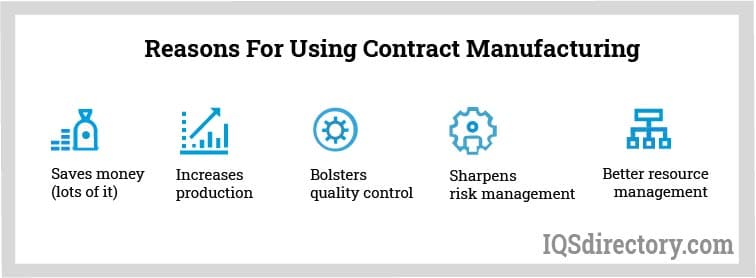 The reasons for selecting contract manufacturing doing production.
The reasons for selecting contract manufacturing doing production.
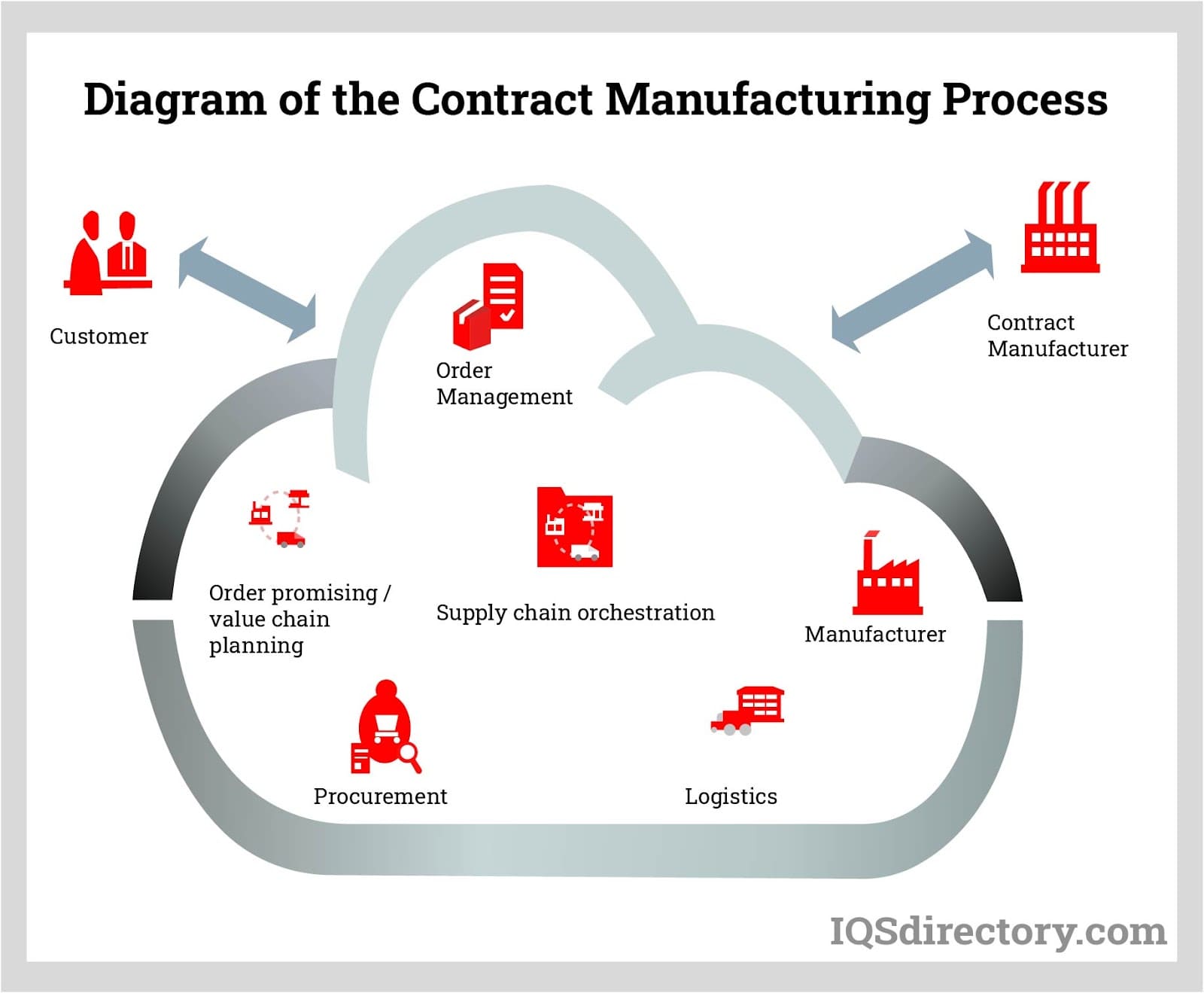 Materials, items, and products produced by the contract manufacturer and sold under the hiring company or used for further processing.
Materials, items, and products produced by the contract manufacturer and sold under the hiring company or used for further processing.
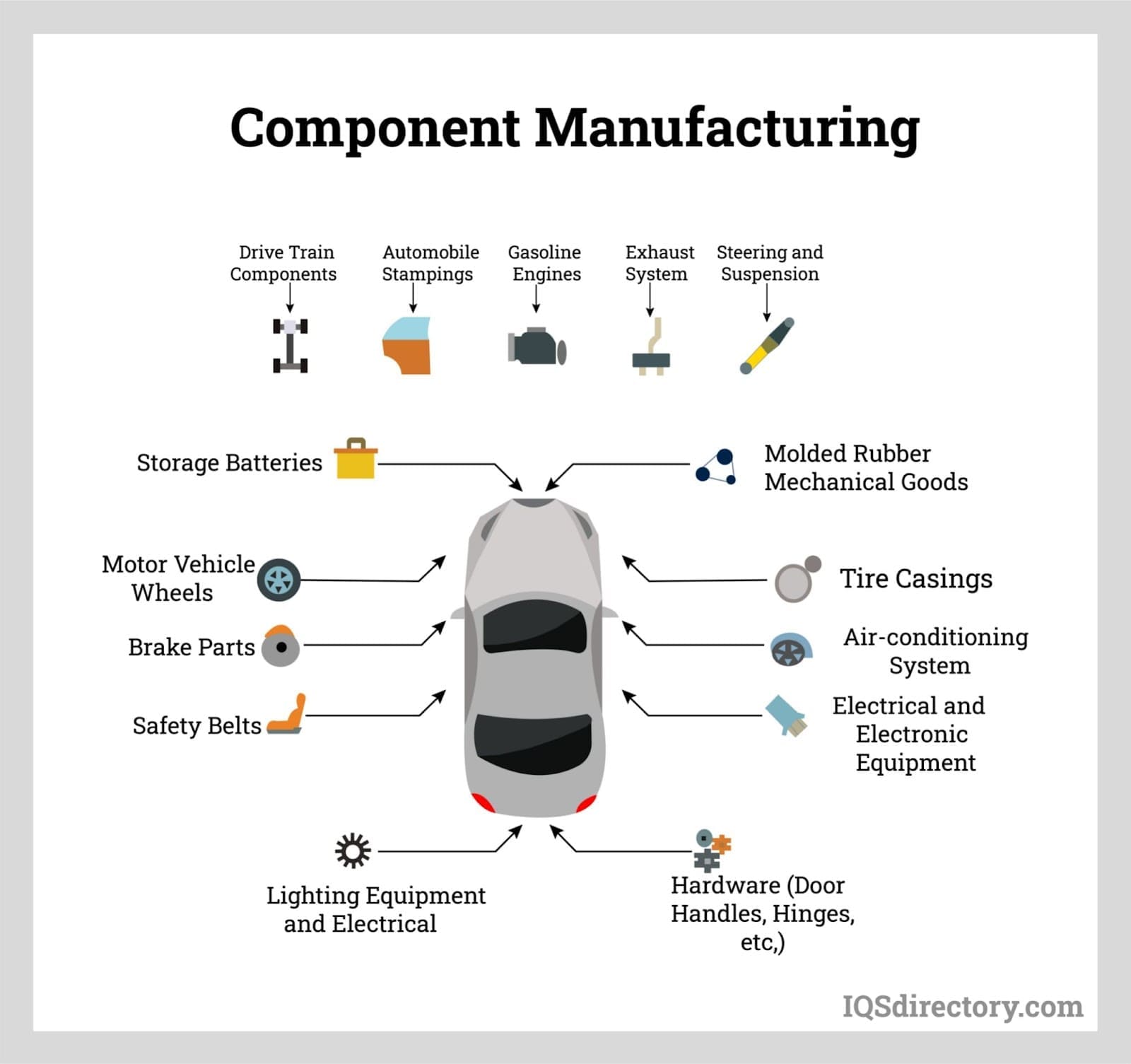 Component manufacturing helps produce components of products because a hiring company cannot afford to produce the components due to a lack of resources or expertise.
Component manufacturing helps produce components of products because a hiring company cannot afford to produce the components due to a lack of resources or expertise.
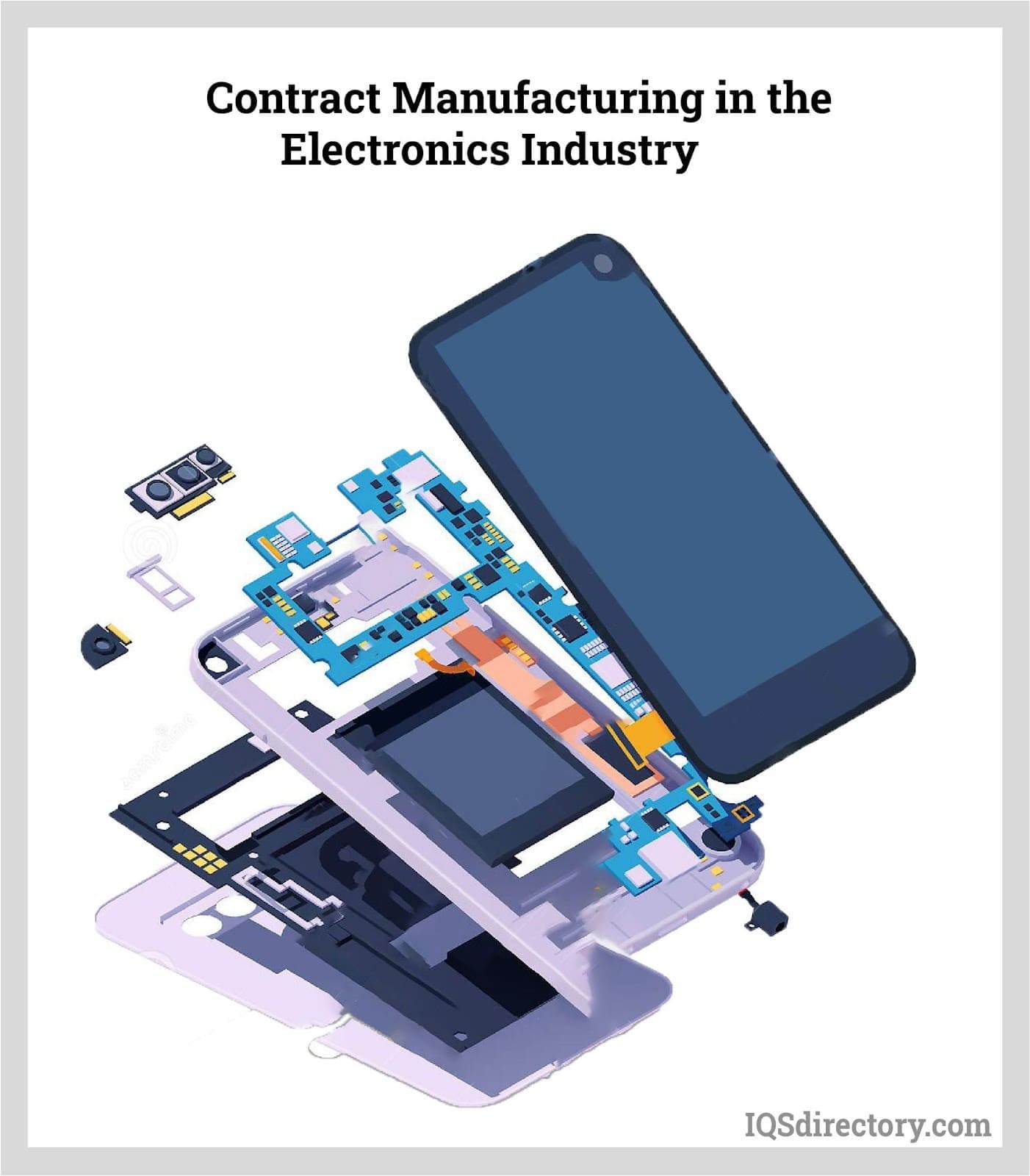 The electronics industry is a leading industry that utilizing contract manufacturing.
The electronics industry is a leading industry that utilizing contract manufacturing.
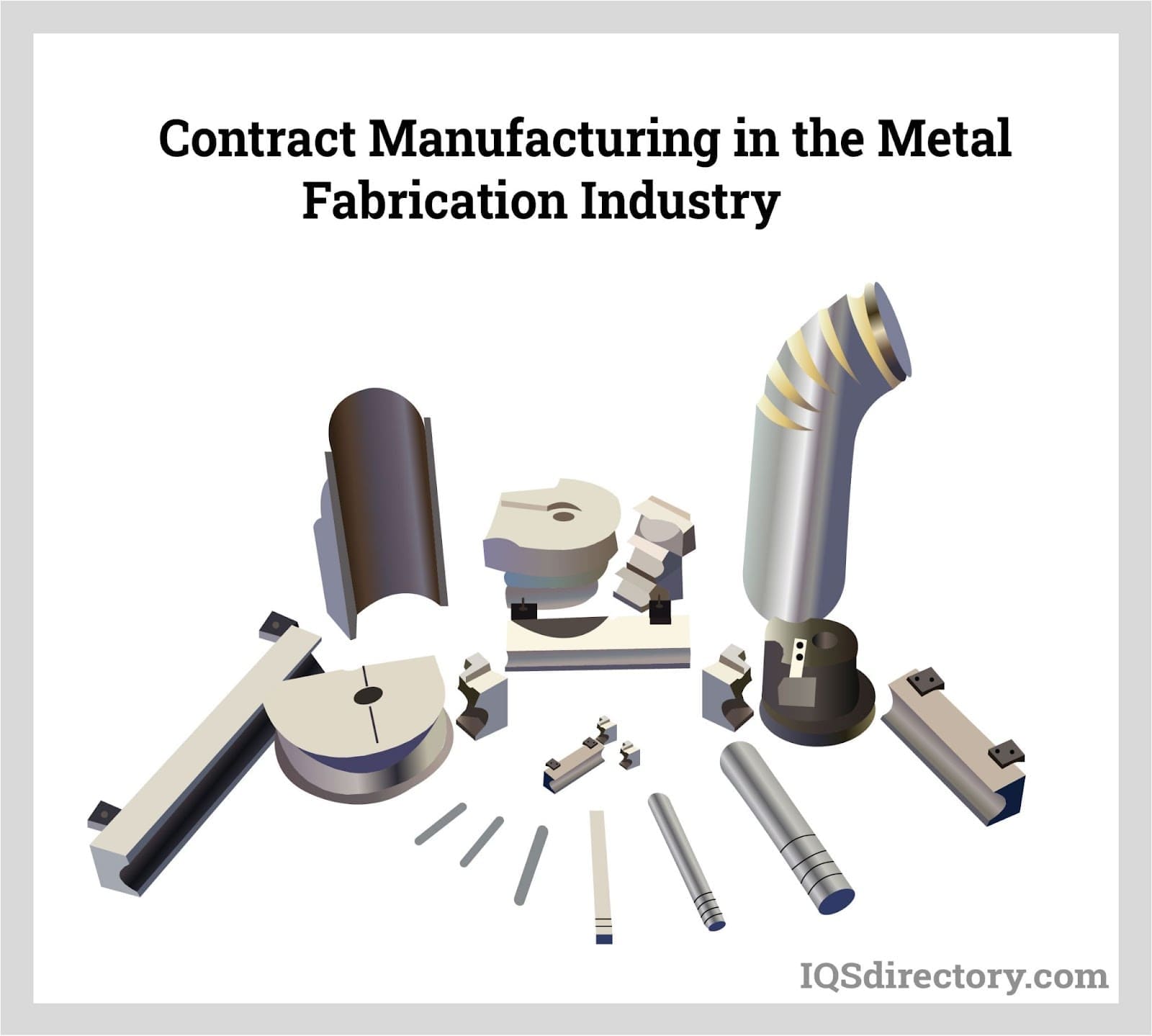 Metal fabrication services are contract manufacturers providing machining, casting, forging, grinding, drilling, spinning, bending, and broaching services for other companies.
Metal fabrication services are contract manufacturers providing machining, casting, forging, grinding, drilling, spinning, bending, and broaching services for other companies.
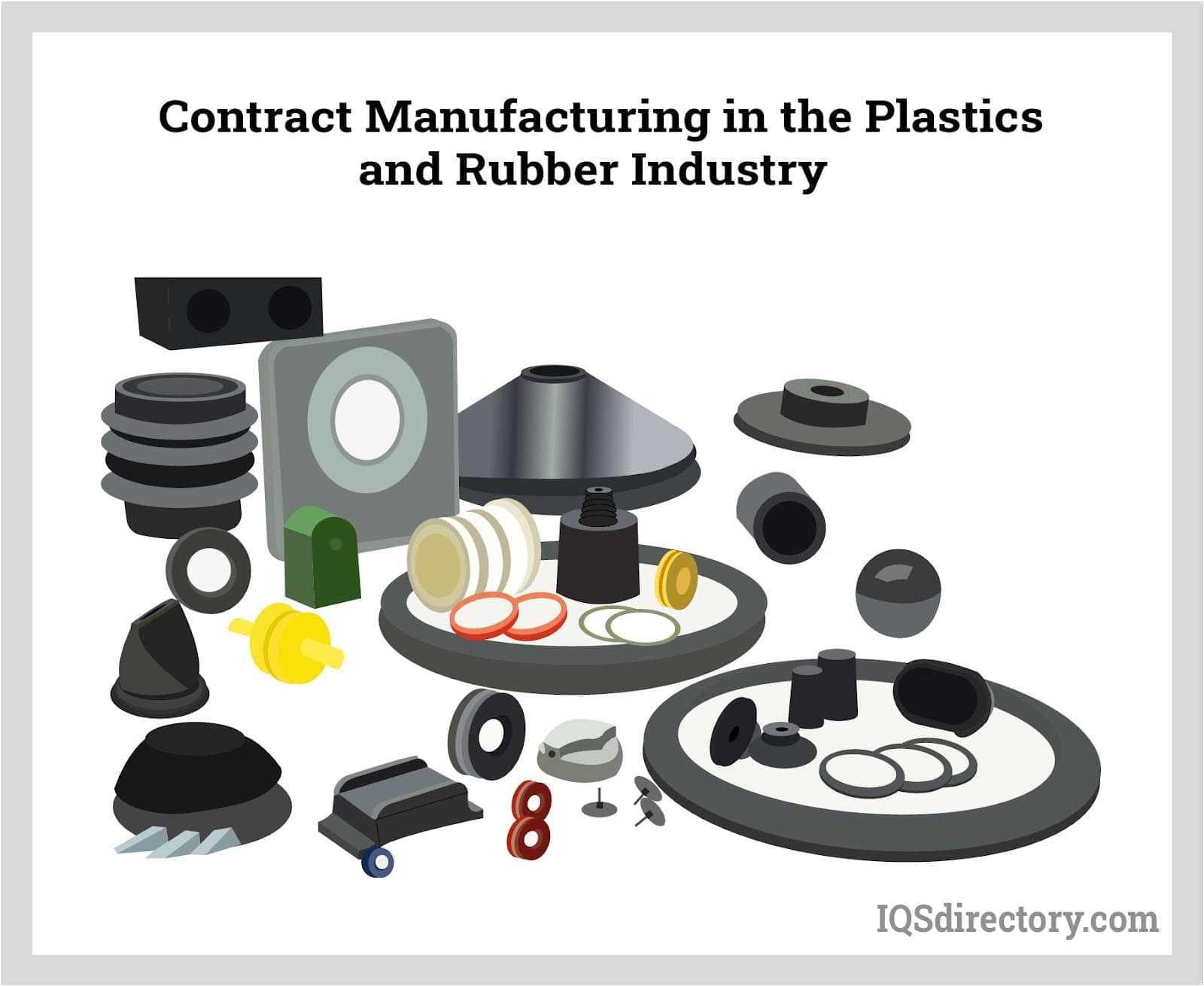 Contract manufacturers that produce finished or semi-finished plastic and rubber components are responsible for tooling design and fabrication.
Contract manufacturers that produce finished or semi-finished plastic and rubber components are responsible for tooling design and fabrication.
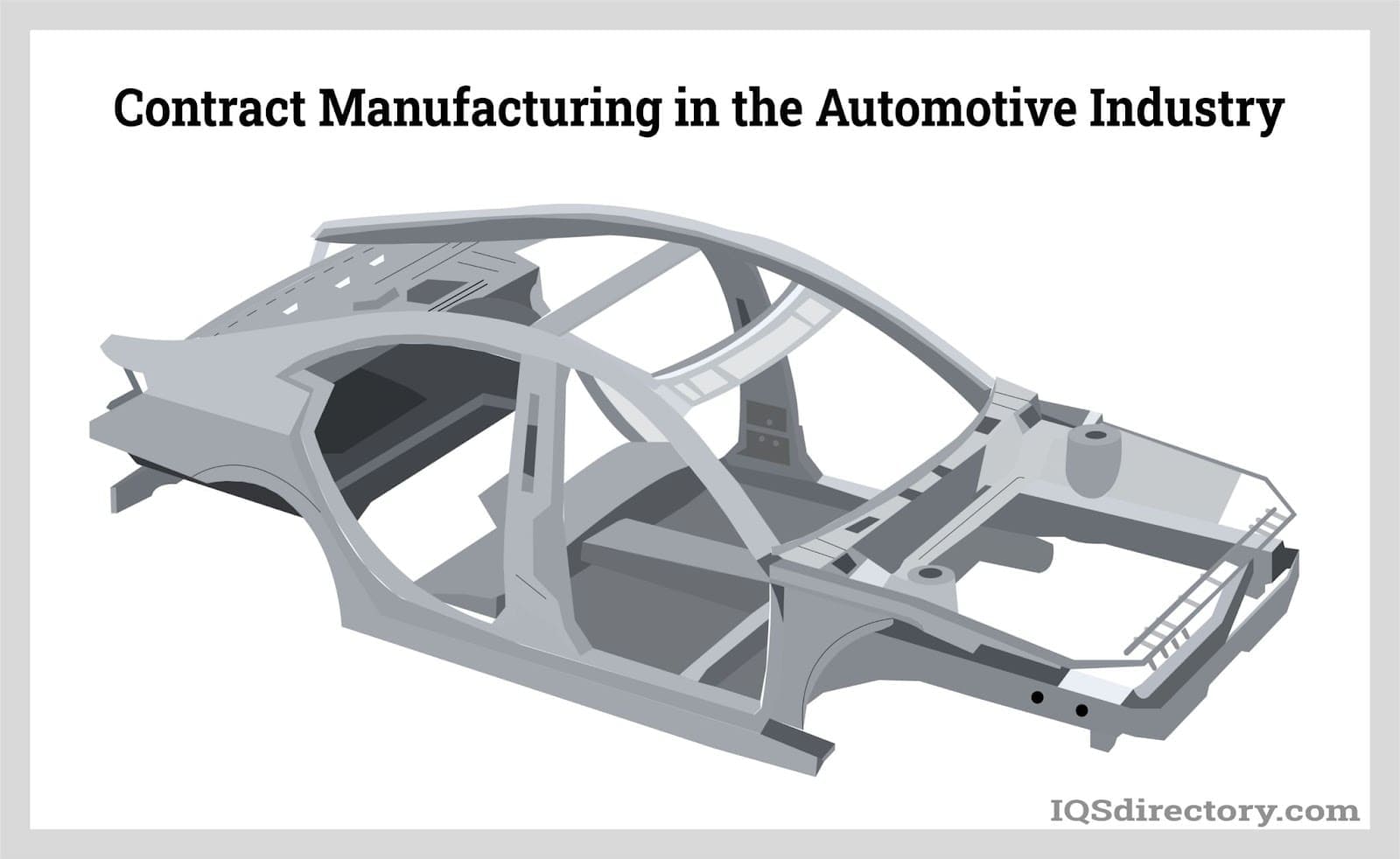 Most automotive companies contract out manufacturing of most of the automobile components, and assembly because automotive parts suppliers focuses on the quality and individual component accuracy.
Most automotive companies contract out manufacturing of most of the automobile components, and assembly because automotive parts suppliers focuses on the quality and individual component accuracy.
Overview of Contract Manufacturing
There are six primary components in every supply chain: the producer of raw materials, the supplier, the manufacturer, the distributor, the customer, and the consumer. Within this sequence, the manufacturer plays a pivotal role by transforming raw materials—prepared and delivered by the supplier—into a finished or semi-finished product. That product is then passed on to a distributor, who ensures it reaches both the customer and the consumer.
Contract manufacturing fits into this framework as a specialized form of labor at the third stage—the manufacturer’s position in the chain. It refers to a service provided by a manufacturing company that has been hired by an OEM to carry out production. These companies, known as contract manufacturers, typically operate solely within this niche, often dedicating their entire business model to it. To maximize their value and efficiency, contract manufacturers usually focus on specific products or industries, building deep expertise in those areas. The agreement between the OEM and the contract manufacturer outlines the specific work to be done, the time frame in which it must be completed, and the amount of compensation involved—sometimes paid in advance. These agreements are frequently bound to strict deadlines not just for production but also for delivery. If a manufacturer can produce a part but fails to deliver it quickly and safely, it’s unlikely they’ll be selected for future projects. Despite such constraints, many contract manufacturers work with multiple OEMs simultaneously—even with companies that compete with one another. Typically, the OEM provides the contractor with designs and specifications, while retaining control over sales and marketing of the finished product.
In a broader sense, the principles underlying supply chain management—the environment in which contract manufacturing operates—have remained surprisingly consistent over time. The priorities of reducing costs and shortening production timelines still dominate. Achieving those goals continues to rely heavily on specialization, technological capability, effective communication, and mutual transparency. What has changed most dramatically is the scale and scope of these operations, thanks to globalization. In today’s world, a single product might travel across several continents before reaching the end user. A component may be designed in Germany, built in the Philippines using materials sourced from China, and finally assembled or sold in the United States.
This global evolution of the supply chain has been powered by major advances in transportation and communication technologies. Without fast and dependable logistics systems, this degree of international collaboration would be impossible. Similarly, improved communication tools have allowed businesses to share information instantly, manage production remotely, and coordinate projects across time zones. These same forces have pushed contract manufacturing to new levels. Companies from all over the world can now compete to fulfill contracts, submit bids, and manage production with unprecedented precision. Contract manufacturing is no longer a local or regional service—it has become a global enterprise open to any company capable of meeting the high standards set by OEMs across industries.
Variations of Contract Manufacturing
As mentioned earlier, contract manufacturing is often referred to as outsource manufacturing. However, the term "outsourcing" carries a geographic implication that can sometimes obscure its meaning. In common usage, outsourcing is frequently associated with manufacturing that occurs outside of North America—historically even referred to more crudely as “farming out.” Technically, though, outsourcing applies to any production process performed outside of the OEM itself, regardless of location. A related term, nearshoring, has gained popularity in recent years. Nearshoring describes contract manufacturing performed either within the same country or in a neighboring one. It is often used as a strategic response to rising international labor costs—such as wage inflation in China—and can help reduce project lead times and minimize logistical hurdles.
Contract manufacturers offer a broad array of production capabilities. These can include traditional processes such as turning, boring, drilling, milling, sawing, shaping, planing, tapping, and grinding, as well as advanced techniques like electrical discharge machining, electrochemical machining, ultrasonic machining, and others. These processes support a variety of services including contract machining, subcontract machining, and contract assembly. Contract or subcontract machining typically involves the creation of original parts, whereas contract assembly focuses on putting together components—often via assembly lines—to deliver a finished product on behalf of another company.
The scope of contract manufacturing extends across a wide range of industries:
Electronic Contract Manufacturing
This sector, which laid the foundation for the entire field, is dedicated to producing highly sophisticated electronic components and assemblies. It remains one of the leading forces in contract manufacturing today.
Industrial Contract Manufacturing
While it often overlaps with the electronics sector (particularly in areas like semiconductors and robotics), industrial contract manufacturing also encompasses a much broader product range. In addition to electronics, this includes heavy industrial equipment, commuter rail infrastructure, plastic components made through injection molding, a variety of rubber goods, and numerous textile products.
Medical Device Contract Manufacturing
This process involves manufacturing companies producing medical devices or specific components that are marketed and sold by a separate entity. Precision and compliance are essential due to strict regulatory requirements.
Pharmaceutical Contract Manufacturing
In this field, contract manufacturers—often called contract manufacturing organizations (CMOs) or contract development and manufacturing organizations (CDMOs)—produce medications, including pills, capsules, creams, liquids, and more. They may also handle containers, packaging, and labeling, all in accordance with stringent pharmaceutical standards.
Chemical Contract Manufacturing
This type of manufacturing involves the synthesis and production of chemical products on behalf of another company. The contractor acquires the necessary materials, compounds, and equipment to fulfill their obligations, often delivering both raw chemicals and finished formulations.
Military Contract Manufacturing
Performed exclusively by specially certified companies in the United States, this manufacturing includes the production of aircraft, weapons, shelters, body armor, and other defense-related equipment. Given the unpredictable nature of government military spending, many military contractors also engage in non-military projects to maintain financial stability.
Aerospace Contract Manufacturing
This sector focuses on the production of specialized parts and products for the aerospace industry, including components for airplanes, helicopters, unmanned aerial vehicles, and military jets.
Choosing a Contract Manufacturer
Several important considerations come into play when selecting a custom manufacturer. At the heart of every supply chain lies a need for consistent, high-quality performance from each link. The contract manufacturer—arguably the most critical link—is central to maintaining the health and efficiency of the entire operation. In today’s digital landscape, where consumers often value affordability over brand loyalty, contract manufacturers play a vital role in delivering competitively priced products that meet market expectations. Ironically, as the importance of selecting the right contract manufacturing partner has grown, so too has the complexity of the decision-making process. Globalization has widened the field of potential partners but has also introduced a daunting range of options. Still, it’s important to recognize that contract manufacturers depend heavily on OEMs—sometimes even more than OEMs rely on them. Since many contractors operate solely in this capacity, their business stability is directly tied to maintaining strong, lasting relationships with OEM clients.
Many of the most telling traits to look for in a contract manufacturer fall into the category of “soft traits”—less tangible but critically important attributes. Because contract manufacturing arrangements are usually long-term, identifying signs of compatibility early on is key. A contractor’s reputation, verified through trusted sources or referrals, can offer valuable insight. When engaging with potential partners, take note of qualities that will support a successful relationship, such as genuine enthusiasm for your product, a willingness to customize and problem-solve, and a proactive commitment to meeting your specific needs. Indicators of transparency and accountability—like openness to trial partnerships or consistent status updates—also signal a contractor’s reliability and investment in a healthy working relationship.
Beyond these interpersonal and cultural signals, more concrete criteria should also be evaluated:
Technological Capabilities
Assess the contractor’s commitment to staying current with the latest technologies, as this reflects both innovation and the ability to meet complex or evolving production needs.
Adherence to Industry-Specific Certifications and Standards
For example, in healthcare manufacturing, compliance with GS1 standards is a critical marker of legitimacy and competence.
Industry Expertise
Years of experience, up-to-date knowledge of regulations, and a demonstrated ability to adapt to industry changes are all signs of a well-qualified manufacturing partner.
Geographic Proximity
Physical location can significantly impact communication efficiency and logistical planning, particularly over the course of a long-term project.
Flexibility with Payment Plans
A contractor’s openness to flexible financial arrangements can indicate transparency and a shared investment in mutual success.
Production Turnaround Policies and History
Understanding how a contractor prioritizes its customers and maintains delivery schedules is essential. A strong track record of on-time production and reliable turnaround policies can make the difference between a smooth partnership and one riddled with delays.
Selecting the right contract manufacturer is more than a logistical choice—it’s a strategic decision that shapes the future of your product, brand, and customer satisfaction.
Contract Manufacturing Terms
-
Bill of Materials (BOM)
A comprehensive list detailing all subassemblies and components required to manufacture a specific product, including the quantity of each material used.
Box-Built
Describes any type of assembly work that excludes printed circuit board production.
Contract Assembly
A process in which one company sends individual or modifiable parts to a contract assembler, who uses their own equipment to assemble the components. The assembled products are then returned to the original company, which profits from their sale.
Contract Machining
A common offering from contract manufacturers that includes services such as milling, wire eroding, punch pressing, and laser cutting. CNC machining services can be found on platforms like IQS Directory.
Contract Manufacturers
Companies that produce goods on behalf of another business. Only the hiring company’s branding appears on the final product—not the name of the manufacturer.
Contract Manufacturing Services
Encompass all processes carried out by a contract manufacturer to fulfill a buyer’s needs. These may include product design, validation, prototyping, assembly, testing, and long-term engineering support.
Core Competencies
Key skills and knowledge essential to a company’s sustained growth and competitive advantage, rather than its products or organizational functions.
Corrective Action Request (CAR)
A formal request—typically issued by an OEM—asking a manufacturer to analyze the root cause of an issue and implement a resolution.
Engineering Change Order (ECO)
A revision to a BOM, such as the substitution of one component for another. ECOs usually include a reason for the change, a description, and an implementation date.
High-Mix, Low-Volume
A manufacturing model characterized by a wide variety of products being made in small quantities.
Intellectual Property (IP)
Any original creation of the human mind, including inventions, ideas, and business methods.
Joint Service Agreement (JSA)
A contract defining roles, performance metrics, and expectations for both the OEM and contract manufacturer, helping to avoid misunderstandings.
Low-Mix, High-Volume
A manufacturing model where a small range of product types is produced in large quantities.
Manufacturing and Supply Agreement (MSA)
A contract outlining the obligations of a contract manufacturer and the OEM, including what will be supplied and at what cost.
New Product Introduction (NPI)
The structured process of moving a product design into manufacturable form while meeting standards for quality, cost, and launch timing.
Non Recurring Expense (NRE)
One-time activities or costs specific to an OEM’s product, such as tooling, programming, or setup services provided by a contract manufacturer.
Original Design Manufacturer (ODM)
A company that develops and manufactures products based on its own intellectual property, often selling them to OEMs for rebranding.
Original Equipment Manufacturer (OEM)
A company that designs and markets products under its own name, often outsourcing the production of those products to contract manufacturers.
Outsourcing
The practice of subcontracting specific processes—like design or manufacturing—to a third-party provider, often a contract manufacturer.
Prototype
An initial model or sample of a device or process used to gather feedback and refine the design before full-scale production.
Request for Quote (RFQ)
A formal document issued by an OEM to a contract manufacturer, detailing the product specifications, quantities, and a BOM to solicit pricing.
Subcontract Machining
Another term for contract machining; refers to mechanical operations involving cutting tools performed on behalf of another company.
Time to Market
The amount of time it takes to develop a product and make it available to customers.
Time to Volume
The time required to scale production from prototype to full-volume manufacturing.
Volume Price Agreement (VPA)
A contractual agreement that defines pricing, deliverables, and cost reductions based on specified production volumes.

